Joe: Where was the beef? What was Willis talking about? Who could it have been now? The 1980s presented us with so many baffling questions. Last January, Mr. Clark and I embarked upon a hazardous journey through some of the the decade's more memorable films in search of answers to these and other queries. And we did learn a great deal about the decade of Reagan and the Rubik's Cube. But more importantly, we learned something about -- wait for it -- ourselves. Along the way, we screened comedies, horror films, dramas, comedies, science-fiction films, and even comedies. Wait, did I mention "comedies" more than once? I'm sorry. It's just that those movies were so god damnably hard to write about that they left a permanent scar on my psyche. Anyway, now that our year-long vision quest is complete (damnit, we should've done Vision Quest!), I thought it was important to get some "closure" on the whole process, which is why I've invited Mr. Clark here for this frank and unguarded conversation about the movies we reviewed. I think I'll start with the obvious question: why the 1980s rather than some other, perhaps more tasteful decade?
Craig: That's a good question, Joe. I was six at the dawn of the decade and 16 when it went bye-bye, so I suppose one could say the '80s was when I came of age as a consumer of popular culture. I'm sure that must also account for why most of the movies I wanted to cover (such as Explorers, Spies Like Us, Buckaroo Banzai and Weird Science) were ones that hailed from the middle of the decade, when I was on the cusp of puberty and thus the most impressionable. And yes, we did lean rather heavily on the comedies as the expense of other genres (I notice that we didn't cover a single action film in the whole lot) and we also shied away from some of the biggest stars like Stallone, Schwarzeneggar, Cruise and Murphy. Even as we set out to watch movies that people had actually heard of (as opposed to things like Trapped Ashes and Repo! The Genetic Opera, which people could happily go their whole lives without ever seeing and never know the difference), we still managed to avoid most of the biggest movies of the decade. Could that be the result of our lingering contrarian streak? Inquiring minds want to know, Joe!
Recently in Reviews Category
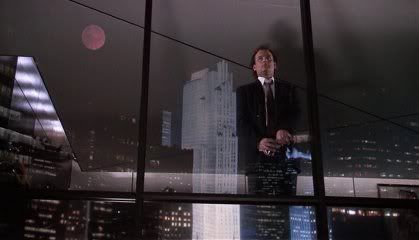
"Oh, my gosh. Does that suck?" - FRANK XAVIER CROSS, a man who knows how to inspire confidence in his underlings
If there is a holiday story that has been brought to the screen (both big and small) more often than Charles Dickens's A Christmas Carol (either in its original form or one that has been modernized, reimagined or otherwise parodied), I don't know what it is. The '80s alone brought us Mickey's Christmas Carol (with Uncle Scrooge in the role he was born to play), a well-regarded made-for-TV version starring George C. Scott (one of several made that decade, in fact), and Blackadder's Christmas Carol, not to mention various television shows and specials. I fondly recall an episode of George Burns Comedy Week from 1985 entitled "Christmas Carol II: The Sequel" in which we find out that Bob Cratchit (Roddy McDowall), Mrs. Cratchit (Samantha Eggar), a very grown-up Tiny Timothy (Ed Begley Jr.) and others have been taking awful advantage of Ebenezer Scrooge (James Whitmore) since his change of heart, prompting the three ghosts to pay him a return visit and show him how to find the middle ground between being a heartless miser and letting everyone walk all over him. In fact, A Christmas Carol parodies are so ingrained in the culture at this point that they don't even need to be tied specifically to the holidays, as seen in last year's Ghosts of Girlfriends Past and 2008's liberal-bashing An American Carol. And this doesn't even take into account all of the stage and radio productions, some of which have taken their own liberties with the story, so finding a new slant on it can be a pretty tall order. (Has somebody done a version that takes place in space yet? If not, they probably will now.)
Which brings us to the final entry in our year-long series, which appropriately enough is centered around Scrooged, the 1988 fantasy-comedy that somehow got sidetracked on its way to becoming a perennial holiday classic. Oh sure, it still shows up on television year in and year out (most Christmas movies do, regardless of their age or quality), but you won't find any channel airing it for 24 hours straight the way TBS does with A Christmas Story (a tradition going back 14 straight years), and it certainly isn't accorded the respect that It's a Wonderful Life's twice-yearly airings earn it (a far cry from its near-ubiquity back in the '80s before its copyright was reasserted). Regardless, it's about the only Christmas film that gets to me on a gut level in spite of the cloying sentimentality that periodically threatens to overwhelm the whole enterprise. Not that I want to be a total Scrooge about it, but this is one film that works a whole lot better when it isn't forcibly ramming holiday cheer down people's throats. And it could use a little less slapstick. Check, make that a lot less slapstick.
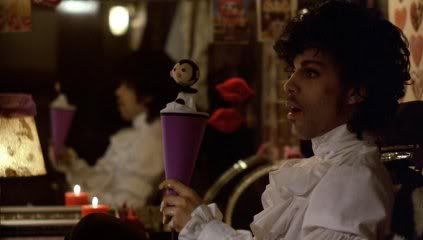
"They finally even made a movie about it... Whenever anything important happens in America, they have to gold-plate it, like baby shoes." - STEPHEN KING, Carrie
Is it still legal to discuss Prince on the internet? I'm pretty sure His Purpleness issued a fatwa some months ago, strictly forbidding the general public from even invoking his holy name on the web. But we believe in taking chances here at Unloosen, so we are ignoring the fatwa and presenting you with this brave, defiant review of Purple Rain.
"The movie" is an important milestone in the lifespan of any pop cultural phenomenon, particularly in America. When some comedian or singer or TV show or toy gets really popular with "the young people," you can be sure "the movie" will be coming soon. After all, the young people are the ones buying the movie tickets for the most part, so Hollywood wants to give them movies about whatever the hell they're interested in this year or this month or this week. Preferably as soon as possible... you know, before they forget. You know how screwy these kids are. One week it's this thing, the next it's something else. Now, the pop cultural phenomenon in question doesn't necessarily have to vaporize a few fortnights later, but it just might. Really, if we are being very hard-nosed about these things, we will see that A Hard Day's Night and Cool as Ice were made for the exact same reason: to capitalize on a teenage fad. Some music act is hot, so let's get them in front of the cameras. Couple this with the fact that pretty much every singer dreams of being a movie star, and you know what you get? Lots of movies starring pop singers. In a weird way, these movies add a sort of permanence to what might otherwise have turned out to be ephemeral. That's why I started this article with that Stephen King quote. These movies really are like gold-plated baby shoes. Pop stars might fall off the charts and into obscurity in a few months, and they inevitably will age and evolve over time. But those movies never change. They're in the can forever, preserving the stars in amber as they were during their zeitgeist-capturing heydays.
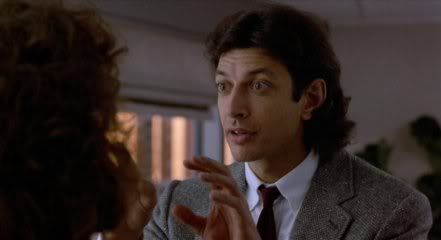
"Is this a romance we're having? Is that what it is?" - SETH BRUNDLE, a brilliant but socially awkward scientist who's working on something that will change the world and human life as we know it
Mainstream horror cinema was in a bad way in the mid-'80s. Following the boffo box office of Halloween in 1978 and especially Friday the 13th in 1980, theaters (and video store shelves) were soon glutted with imitation slasher flicks about masked maniacs stalking frequently unclothed young women and hacking them to pieces with assorted kitchen utensils and gardening tools. This is, of course, not to forget the innumerable sequels these films engendered, few of which existed for anything other than mercenary reasons. This trend was also occasioned by a veritable race to the bottom with makeup artists of all skill levels competing to see who could devise the most nauseating gore effects which, more often than not, had to get cut back significantly in order for the films in which they appeared to get the all-important "R" rating. (This was well before the vogue for "unrated" video releases, so if something didn't cut the muster with the MPAA it generally wouldn't get seen outside of the grindhouses and urban markets.)
This is, of course, not to suggest that all was doom and gloom. Discriminating horror fans who dug a little deeper were rewarded with the occasional gem, and there were certain directors who could be counted on to deliver the genre goods while still treating their subjects with a certain amount of intelligence. One such director was Canadian auteur David Cronenberg, who had started making a name for himself a decade earlier with a low-budget film called Shivers, which was renamed They Came from Within when it was released in the States and caused a stir among horror aficionados. Over the next few years he followed it with Rabid (the legitimate acting debut of Behind the Green Door star Marilyn Chambers), The Brood (which was identified as a cult movie by no less an authority than Danny Peary) and Scanners (which was his commercial breakthrough in the American market). Being number one at the box office for one weekend (as Scanners was) brought Cronenberg to the attention of Hollywood and thus began the process of introducing his work to a wider audience. Of course, a major part of that would involve downplaying the extreme imagery (like the phallic organ in Chambers's armpit in Rabid or the exploding head in Scanners) that punctuated Cronenberg's films. What appealed to the Fangoria crowd wouldn't necessarily fly with general audiences -- not without some help.
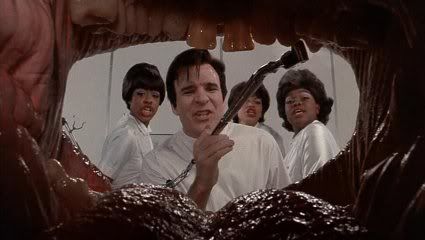
"Take a breath and look around. A lot of folks deserve to die." - AUDREY II, a carnivorous talking plant
Time for a moral self-inventory. What would you do for money? Fame? Love? All three at once? Think it over.
Let's say you lived in misery and poverty and were mocked and rejected on pretty much a daily basis. No one but no one respected you. Pity? Maybe. But respect? No. Let's also say that you were desperately in love with a co-worker who remained sadly out of your reach despite being just a few tantalizing feet away from you each day. Now let's further imagine that you stumbled across a miraculous solution to all your problems, a solution which unfortunately required you to kill a few people. Would you do it? Would you start murdering people? And would you commit further murders to cover up your earlier ones? After all, people are bound to start asking nosy questions...
Legendary B-movie screenwriter Charles B. Griffith seemed to think that, under those particular circumstances, a person of weak character might just become a killer, especially if the first few murders were more or less accidental and if the "victims" were largely unsympathetic. So in 1959, he wrote a cheap but effective little horror-comedy called A Bucket of Blood, in which a simpleminded schlemiel of a busboy (played by Dick Miller) stumbles first into killing and then into overnight success as a sculptor when he turns the corpses of his victims into "statues" by coating them with plaster and passing them off as works of art. The very next year, that film's director, Roger Corman, needed a script pronto in order to take advantage of some standing sets, so Griffith churned out a wackier variation on A Bucket of Blood, amping up the comedic and satiric elements, adding an absurd supernatural threat (a talking killer plant), and generally aiming for a freewheeling sketch-comedy/comic book feel, complete with silly names, throwaway gags, and wacky background signs. The resulting film, The Little Shop of Horrors, told the strange story of klutzy flower shop employee named Seymour (MST3K stalwart Jonathan Haze) whose apparent ticket out of Skid Row was a bloodthirsty talking plant, Audrey, Jr., who demanded human victims. In a way, the carnivorous plant of Little Shop was an even better metaphor for the vicissitudes of fame than the "statues" of Bucket of Blood. A plant, like fame, can either grow or wilt and must constantly be fed and tended to. In any event, Corman and Griffith's Little Shop had a shadowy half-life in the 1960s as the bottom half of a double bill with Mario Bava's Black Sunday but went on to be a perennial favorite at campuses and revival houses in the ensuing decades. Such was the film's enduring popularity that in 1982 -- twenty-two long years after its initial, ignoble release -- it became an off-Broadway musical by composer Alan Menken and lyricist Howard Ashman.
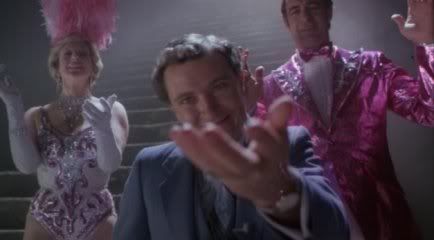
"Mum! Dad! Don't touch it! It's evil!" - KEVIN, the soon-to-be-orphaned 11-year-old boy, at the end of Time Bandits
Long before I knew who -- or what -- Monty Python was, I was already a fan of the work of half of that venerable comedy troupe's members thanks to a certain subversive children's film called Time Bandits, which was a big hit at the box office when it was released in 1981. Unfortunately, I didn't get to see it when it was in theaters, but thanks to frequent airings on PRISM (a Philadelphia-area premium cable channel that broadcast all the Flyers and Phillies home games, which is why my father insisted on it over higher-profile movie channels like HBO or Cinemax), it was a staple in the Clark household for many, many years. It was only much later when I started reading up on Monty Python in Kim "Howard" Johnson's First 200 Years of book that I discovered that Terry Gilliam, the American-born cartoonist who gave the Flying Circus its distinctive animated links, was also the man responsible for one of my favorite films of all time. Furthermore, it starred two other members of the troupe (John Cleese and Michael Palin) and one of them (Palin) had also co-written the film with Gilliam. If that doesn't make it a de facto Python film, then I don't know what will.
Anyway, whether they did so knowingly or not, Gilliam and Palin (and to a lesser extent Cleese) laid the groundwork for my future Python fandom (some might call it an obsession) and found the nexus between history and comedy that has informed my sense of humor to this day. That's a lot of baggage for a rollicking adventure story about a band of dwarfs in the employ of the Supreme Being who jump through holes in the fabric of time to steal from the rich and give to themselves, but Time Bandits can shoulder it. If it couldn't, it wouldn't be so well-beloved nearly three decades later -- and this isn't rose-tinted nostalgia talking. The film really does hold up and it stands as a testament to the power of imagination and individualism, two of Gilliam's pet themes which run through all of his films and which are embodied by its boy hero Kevin, played by 11-year-old Craig Warnock, who wins my vote for Best Child Actor Ever.
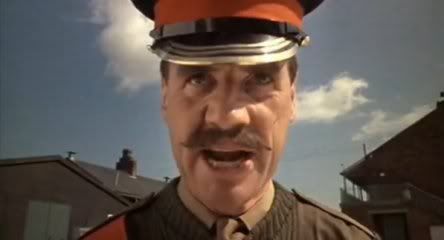
"We praised the Almighty far beyond what any reasonable entity would have felt comfortable with, and blessed many, many things." - ETHAN COEN in his short story "I Killed Phil Shapiro"
What kind of sane, rational, responsible God would actually want to be worshiped? Shouldn't God be embarrassed by all those flattering hymns, prayers, and ceremonies -- not to mention wars -- in His honor? You'd think so, but a good portion of the Old Testament is given over to God's all-consuming desire to be venerated and obeyed by the people He created. In fact, according to many of His most fervent admirers, God still disapproves of such practices as birth control, homosexuality, and divorce because they deprive Him of earthly offspring. After all, fewer babies mean fewer worshipers, and He can't tolerate that. So be fruitful and multiply, everybody, and if you're a destitute Catholic ex-mill-worker with 70 hungry Catholic children and no income with which to support them, well, you can always sell the little buggers for medical experiments.
These were among my thoughts as I recently re-watched Monty Python's The Meaning of Life for what must be the fiftieth time. I "discovered" this 1983 film, the troupe's last proper group effort, during the early 1990s when I was still in high school, and I'm happy to report that it is still able to make me laugh -- and think -- all these years and viewings later. In fact, when screening the DVD in preparation for this article, I chortled loudly at the antics of Michael Palin's buffoonish Sgt. Major and John Cleese's fawning French-accented Maitre D', even though I knew in advance everything these men were going to say and do. If anything, time has given this film a luster it might not even have had when it was originally released. Nowadays, when "comedy" largely consists of pop culture in-jokes, jaundiced snark, and infantile male bonding, a comedy as audacious and ambitious as The Meaning of Life is a thrill.
And yet, even today, the film does not get the respect that it perhaps deserves from critics, viewers, and even the Pythons themselves, who are divided as to the film's merits. Mention The Meaning of Life on any film-related Internet forum, and you'll get the same few standard complaints. Perhaps foolishly, I will try to address these one by one. Let's see now...
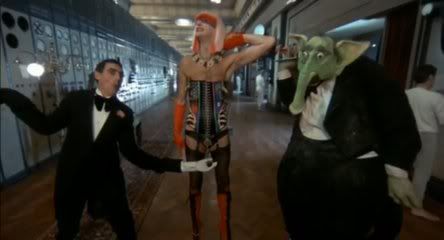
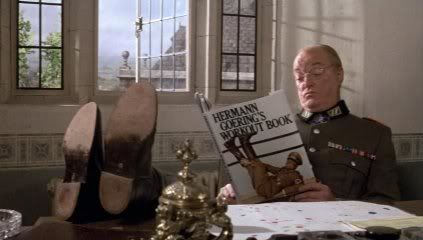
"Things change, people change, hairstyles change... Interest rates fluctuate." - HILARY FLAMMOND
Sometimes it feels like I grew up during the golden age of the genre parody, and that age -- now sadly passed -- will never return. The year after I was born, Mel Brooks released not one but two classic spoofs, Blazing Saddles and Young Frankenstein, and while he didn't invent the form he certainly was its standard-bearer for many years. In addition, my comedy intake also included healthy doses of Woody Allen, Zucker-Abrahams-Zucker and Monty Python, and they were no slouches in the parody department, either. The problem is they were a little too good at it because most everything that has come down that road over the past two decades can't help but seem anemic and undercooked in comparison. And just so we're clear, I'm not just talking about the oeuvre of odious crap merchants like Jason Friedberg and Aaron Seltzer here (although they have led the charge in recent years). Even before they came along there was half-baked dreck like Repossessed, National Lampoon's Loaded Weapon 1, Fatal Instinct, The Silence of the Hams, Wrongfully Accused and 2001: A Space Travesty, none of which did a whole lot to advance the art of the parody film. Even Brooks himself stumbled with his last two directorial efforts, Robin Hood: Men in Tights and Dracula: Dead and Loving It, which were made to parody one specific film almost exclusively. That sort of thing is very rarely a recipe for success.
Of course, this isn't to say the single-film parody can't work. When the Kentucky Fried Theater (Jim Abrahams, David Zucker and Jerry Zucker) made the transition from stage to screen with The Kentucky Fried Movie in 1977, the centerpiece of the film was A Fistful of Yen, a dead-on parody of Enter the Dragon that takes up about a third of its running time. And that trend continued when the trio stepped into the director's chair with Airplane! three years later. While it may seem like just a take-off of the Airport series of the '70s (which had already descended into self-parody by the time The Concorde ... Airport '79 limped into theaters), Airplane! is actually a shockingly faithful remake of a thriller from 1957 called Zero Hour! that stars Dana Andrews as a war veteran who has to be coaxed into landing a commercial airliner when the crew takes sick and he's only passenger on board with any flying experience. The ZAZ team not only borrowed the basic plot, they even incorporated whole scenes from the original film into their script without having to change so much as a single line. That's how deliriously over-the-top and melodramatic Zero Hour! is. (The casting is also key, with Robert Stack's part being played by Sterling Hayden. And the stunt casting of Kareem Abdul-Jabbar as co-pilot Roger Murdoch is prefigured by the pilot in Zero Hour! being played by football hero Elroy "Crazylegs" Hirsch.) The genius of the ZAZ approach was to take the conventions of whatever situation they started with and tweak them ever so slightly, upping the ante with each iteration until it reaches the point of total absurdity. It would have been good for a shock if Steve McCroskey had declared right off the bat that he had picked the wrong week to quit sniffing glue, but it's a lot funnier after we've seen him progress through smoking, drinking and taking amphetamines first.
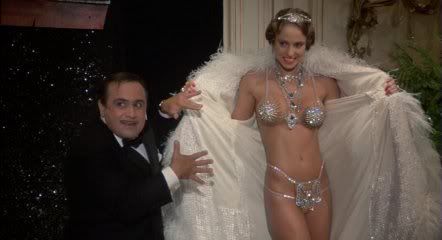
"You're dead for a real long time. You just can't prevent it. So if money can't buy happiness, I guess I'll have to rent it." -- "WEIRD AL" YANKOVIC
To paraphrase one Tom Servo, some films simply defy the laws of sequential occurrence in space and time. Such a film is Amy Heckerling's 1984 sophomore effort, Johnny Dangerously. Why did 20th Century Fox feel that America needed or wanted an Airplane!-type spoof of melodramatic 1930s gangster pictures, specifically those of James Cagney? As it turned out, the film died a quick and ignoble death, shunned by critics and audiences alike one grim September before finding a marginal place in the pop culture landscape as a perennial time-slot filler on local TV stations and a semi-cult favorite on home video. When viewed objectively in 2010, Johnny Dangerously seems like a well-intentioned near-miss, chockablock with spirited comic performances, endearingly baroque touches, and memorable running gags, yet somehow missing that indefinable spark of creative genius that elevates a film to the level of a classic. And yet, for some nebulous reason, the film holds a mysterious, hard-to-explain charm. I myself have fallen under the film's sway to some degree and have watched it several times in preparation of this very article. Why? What is the secret of Johnny Dangerously?
To answer that question, I have made rather a study of this curious film -- unscientific, yes, but earnest in its diligence nevertheless. Herewith, I present (with very minimal attempt at organization) my observations on Johnny Dangerously. I hope you will find them edifying.
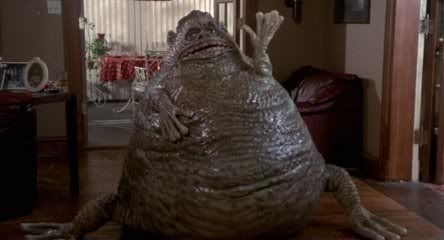
"Do you think God knew what He was doing when He created woman?" - DARYL VAN HORNE (not pictured)
When one thinks of '80s movies, one name that comes to mind almost immediately is John Hughes. A former writer for National Lampoon who parlayed his work on the humor magazine into film gigs like 1982's National Lampoon's Class Reunion (his screenwriting debut and an unmitigated disaster), Mr. Mom and the first of the long-running Vacation series, Hughes moved into the director's chair with 1984's Sixteen Candles, a seminal teen comedy and cultural touchstone for just about anybody who came of age in the '80s. Its success led to a string of films set in and around the fictional Chicago suburb of Shermer, Illinois, some of which (The Breakfast Club, Ferris Bueller's Day Off) Hughes directed and others (Pretty in Pink, Some Kind of Wonderful) for which he merely wrote the screenplay. And smack dab in the middle of them all was the totally bonkers Weird Science, which is far from Hughes's best work as a writer or a director, but it stretched him in ways that his more ordinary fare did not.
Briefly, the story revolves around a pair of scrawny outcasts (Hughes regular Anthony Michael Hall and Ilan Mitchell-Smith) who use a computer to create supermodel Kelly LeBrock out of thin air and proceed to have a wild, wild weekend with her. As we noted in our Superman III article, most people who lived in the '80s didn't know what computers were actually capable of, so a film like Weird Science could posit a scenario where a couple of geeks -- inspired by a late-night viewing of the Universal classic Frankenstein (which, incidentally, has suffered the indignity of being colorized) -- could make a working computer simulation of a woman on a 5" floppy disk by scanning a bunch of photographs into a device that looks suspiciously like a printer. Furthermore, when Hall decides they need more power, all they have to do is tap into a local military installation's network (using a primitive phone receiver modem) and it's there at their fingertips. (The sequence where Smith uses his hacking skills to get past the mainframe's security system features some Tron-like CGI and even a Twilight Zone reference.) Of course, simply scanning in a photo of Albert Einstein shouldn't be able to give their simulation Einstein's IQ, nor should hooking up a Barbie doll allow them to transfer it into the body of a real live woman, but there are certain allowances that one simply has to make with a fantasy film, otherwise you might as well just stay home.
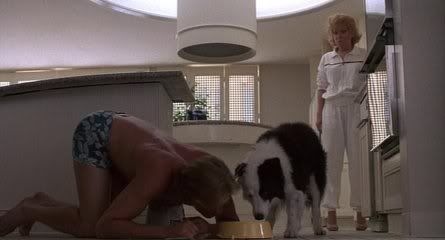
"And you may know how little God thinks of money by observing on what bad and contemptible characters he often bestows it." -- THOMAS GUTHRIE (1865)
Disney's making dirty movies!
Well, no. Not really. But that was the consensus among prudes, alarmists, and moral watchdogs alike in the mid-1980s when the Walt Disney Company began financing a series of R-rated movies through a then-fairly-new subsidiary of theirs called Touchstone Pictures. Never mind that the hallowed "D" word never appeared anywhere in these films' credits or advertising. The evidence was clear: a bastion of good, clean, wholesome family entertainment was now up to its mouse ears in the smut racket. Won't someone please think of the children?
I can still remember then-also-newish Disney CEO Michael Eisner appearing on ABC's 20/20 and squirming genially as a reporter showed him a particularly risque clip from of one of Touchstone's latest offerings, Down and Out in Beverly Hills and asked him if this sort of thing was appropriate for Disney to be releasing. The clip involved Richard Dreyfuss as a wealthy married man having adulterous sex with his maid while the family dog watches through a window. To make matters worse, the maid was actually on top during said fornication, a clear breach of missionary-position-only sexual protocol. (NOTE: This was long before Disney actually owned ABC. Wonder if the same kind of story would air on 20/20 today?) Eisner's answer, as you might guess, was political. Down and Out, he faux-cheerfully explained, was not really a Disney movie per se, at least not in the Bambi/Snow White sense. It was just an adult-oriented comedy which happened to be financed by the Walt Disney Company. That's all.
Disney, you must remember, had spent much of the 1960s and all of the 1970s flooding the film market with gimmick-laden, low-ambition "family comedies" aimed at the notoriously undiscriminating kiddie audience. Think: lots and lots of Herbie sequels and cute-animal flicks. As a result, the term "live-action Disney movie" was not exactly synonymous with "quality," and even that particular teat had run dry by the end of the Carter years. Disney continued to make live-action films in the 1980s, but these tended to be adventure and fantasy stories, like Tron and The Journey of Natty Gann. The only way for Disney to make live-action comedies and dramas that adults might actually pay money to see was to do so under another name. Ergo, Touchstone. And the gambit paid off beautifully with a string of well-received, financially-successful pictures. Today, the familiar circle-and-lightning-bolt insignia of Touchstone is just another meaningless corporate logo, imparting nothing of significance to the average moviegoer. But for a few years there in the mid-to-late 1980s, Touchstone Pictures was something of a brand name to critics and knowledgeable audiences alike, much as, say, Judd Apatow's name is today. A Touchstone comedy was generally expected to be a little sharper, a little fresher, a little funnier than the average multiplex offering. The company even had its own stable of stars, veteran film and TV performers who appealed more to parents than to kids: Richard Dreyfuss, Danny DeVito, and of course the Queen of Touchstone herself, Miss Bette Midler, who vaulted back into stardom with her appearances in Down and Out in Beverly Hills and Ruthless People, both released in 1986.
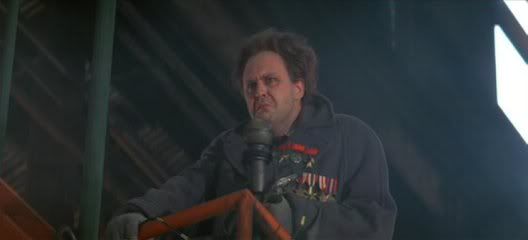
"Cult films don't make money." - BILL LANGE, producer of Massacre at Central High
"Laugh-a while you can, monkey-boy." - DR. EMILIO LIZARDO, eccentric Italian physicist possessed by Lord John Whorphin, an evil Red Lectroid from Planet 10
When I suggested "Cult on Arrival" month I had but one film in mind and that was 1984's The Adventures of Buckaroo Banzai Across the 8th Dimension, a fast-paced, effects-laden science fiction extravaganza that had the potential to kick off a franchise but fizzled at the box office. Made by a first-time producer-director (W.D. Richter, who cut his teeth as a screenwriter on films like Peter Bogdanovich's Nickelodeon, which he co-wrote with the director, and the late-'70s adaptations of Invasion of the Body Snatchers and Dracula) and a relatively unknown screenwriter (Earl Mac Rauch, whose only prior credits were the little-loved urban thriller A Stranger is Watching and Martin Scorsese's sprawling musical New York, New York), Buckaroo Banzai was always going to be a hard sell, but you can tell that they made the film for the love of it, not because they thought they were going to get rich off it. (Of course, if it had been a runaway success, I don't believe they would have turned those riches down.)
The other group of people that Richter and Rauch arguably made the film for were the sci-fi, fantasy and comic book geeks who were in the habit of anointing whatever blockbusters Hollywood threw their way and could presumably be counted to spread the word about their film's idiosyncratic hero, a world-renowned neurosurgeon, rocket scientist and rock star who just so happened to also have his own comic book (at least in the world of the film). And so the studio went directly to the fans, showed them the trailer, handed out Buckaroo Banzai headbands (one of which I was given by a college friend) and did whatever they could to try to drum up interest in the film. These tactics drew the ire of notable crank Harlan Ellison, who used his January 1985 column in The Magazine of Fantasy and Science Fiction to decry the "billion dollars' worth of promotional hype such as Big Brother-style rallies at sf conventions" being used to sell what he called "this village idiot of a movie." Needless to say, he was not impressed with it.
Luckily, I was already an avowed fan of Buckaroo Banzai, having seen it many times on cable, by the time I read Ellison's withering four-paragraph dismissal of it in his 1989 collection Harlan Ellison's Watching, so I've never let it influence my opinion of the film. Then again, within its pages Ellison also derides Star Wars, John Carpenter's The Thing, Gremlins ("it is a corrupt thing, vicious at its core"), The Last Starfighter, Back to the Future, Robocop ("a film that struck me as being made by, and for, savages and ghouls") and Spaceballs -- all of which I have varying degrees of affection for -- so I know to take his criticisms with the proper amount of seasoning. Then again, he also has high praise for an obscure 1973 film called Slither, which just so happened to be Richter's screenwriting debut, calling it "the world's longest, funniest Polack joke." And he champions Big Trouble in Little China, which Richter also had a hand in, so it's clear he doesn't prejudge a film one way or the other based on who made it (although he never does seem to have a kind word for Brian De Palma).
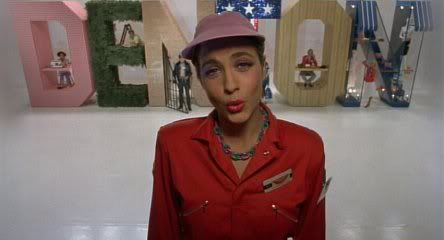
"It was hoped that Shock Treatment would repeat the success of The Rocky Horror Picture Show. And I think in hindsight that what you realize is that you can't create a cult. Cults happen organically. An audience finds a movie, embraces it, and makes it into a cult." - JOHN GOLDSTONE, producer
When a Hollywood movie is released to popular acclaim and financial success, the next step is clear: give the audience more of the same, only with the volume turned up, as soon as possible. It helps, of course, if the first movie belongs to an easily-identifiable category (comedy, action, horror) and leaves its most popular characters alive and ready for further adventures at the end. But how do you follow up an unexpected, late-blooming hit like The Rocky Horror Picture Show, a bizarre, cross-genre mishmash which ends with the death of its central and most popular character, the transvestite alien mad scientist Dr. Frank-N-Furter (played by Tim Curry)? Such was the question plaguing the executives at 20th Century Fox back in 1979 in the wake of Rocky Horror's highly unlikely reversal of fortune. British writer/actor Richard O'Brien's oddball 1972 stage musical The Rocky Horror Show had been a hit in London and Los Angeles, but an attempt to bring the show to Broadway had flopped by the time Fox's film adaptation limped into theaters in the fall of 1975. It looked like another pop culture fad had come and gone, but amazingly the movie -- about a square American couple, Brad and Janet, who undergo a night of debauchery in the Gothic castle of Dr. Frank-N-Furter -- somehow became the object of intense adulation among its hardcore fans, who used the film as the center of a truly unique multimedia phenomenon. Weekly showings of RHPS incorporated live performance, audience participation, and the filmed image. Complicating matters further, as far as a sequel was concerned, the film's following was at least partially ironic: the tradition of yelling "callbacks" at the screen started as a form of heckling during the many awkward pauses in the dialogue. But, still, the demand for more Rocky was definitely there, and so O'Brien got to work on a sequel to his famous/infamous creation.
The initial result of O'Brien's labors was a screenplay called Rocky Horror Shows His Heels, conceived as a direct sequel to the first film in which Dr. Frank-N-Furter rises from the grave, Janet gives birth to his half-alien baby, and Brad reveals himself to be homosexual. This script, accompanied by a demo tape of new songs, apparently did not instill much confidence in the Fox brass, so O'Brien set about reworking the project with Jim Sharman, the director and co-writer of the original Rocky Horror film. Eventually, through a series of rewrites, Heels mutated into something called The Brad & Janet Show, which in turn became what we now know as Shock Treatment. Along the way, all three principals from the first film -- Tim Curry, Barry Bostwick, and Susan Sarandon -- either became unavailable or backed out, and the entire project had to be reconceived on a much-smaller budget following an actor's guild strike. What had been planned as a location shoot in Dallas, Texas would now be filmed entirely within a British soundstage. The resulting film came out in 1981, six long years after the first, and was quickly rejected by the Rocky Horror cultists, who felt they were being manipulated by the Fox publicity machine. An attempt to show the film at New York's Waverly Theater, birthplace of the Rocky Horror cult, proved disastrous and led to a scathing editorial in the Village Voice entitled "Mock Rocky," deriding this prefabricated attempt to create another Rocky Horror. Outsiders seemingly had no interest in the film either, and it vanished into home video obscurity. And that is pretty much where Shock Treatment's reputation lies today. When the film is mentioned at all nowadays, it is used as a cautionary example of why a studio should never, ever try to intentionally create a so-called "cult" movie. The history of Shock Treatment, one would be tempted to say, has been written. Its fate is sealed. The verdict is in, and it's guilty. Right?
Well, possibly. But every defendant is entitled to the benefit of counsel, right? That's where I step in.
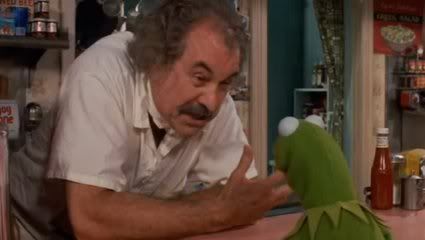
When we first started throwing out potential movie titles for this series, one of Joe's suggestions was The Great Muppet Caper, which would have made for a great case study, but I decided that I'd rather tackle the Muppets' third cinematic outing, 1984's The Muppets Take Manhattan, since it represented something of an end of an era. It was also, for whatever reason, the only one of the three that I didn't see in theaters. (I guess I thought I had outgrown them or something, because I didn't lobby to see it the way I did with Indiana Jones and the Temple of Doom the same year.) As for the first two, I have to take my mother's word for it that I was taken to see The Muppet Movie at the tender age of five (going on six) because I have no clear recollection of it, but I have no such problem with The Great Muppet Caper. In fact, one of my earliest memories of going to the movies was the mob scene at a kiddie matinee of that film in the summer of 1981. But even that didn't make as much of an impression on me as seeing the melting faces at the end of Raiders of the Lost Ark, which was released just two weeks earlier. As I recall, my mother was beside herself when that scene came up, but I thought it was just dandy (which probably explains why I was chomping at the bit to see Temple of Doom three years later).
Looking back on it now, it's hard to believe how much I was at the mercy of my parents when it came to going to the movies, yet that clearly was the case. In general, the Clarks went as a family unit to all the big "event" films like E.T., Ghostbusters and Who Framed Roger Rabbit?, which -- along with the Superman, Star Wars, Star Trek, Indiana Jones and Back to the Future series -- made up the bulk of our movie-going diet. If there were children's films to be seen, though, our father opted out of them, which was how he managed to escape the ravages of Annie, Supergirl, The Goonies, Howard the Duck or anything that was even vaguely animated. (Not that there were many animated films of note in the early '80s. I don't even think we saw The Fox and the Hound.) That policy also extended to the Muppet movies, which may explain why my mother decided to give The Muppets Takes Manhattan a pass. Having run the gauntlet on The Great Muppet Caper, she may have simply declined to do so again.
As a result, I didn't see The Muppets Take Manhattan (hereafter TMTM) until about a decade later when I was in college and experienced a resurgence of interest in the work of Jim Henson. The main catalyst for this was a 1994 PBS documentary called The World of Jim Henson, which -- in tandem with the book Jim Henson: The Works -- The Art, the Magic, the Imagination by Christopher Finch -- opened my eyes up to the man's artistry in a way that was entirely unexpected. Both were filled with detailed accounts of his career before the creation of Sesame Street and The Muppet Show (another mainstay of my youth) and his attempts to branch out into more adult fare like his 1965 short Time Piece (which was nominated for an Academy Award for best live-action short feature) and an experimental TV film from 1969 called The Cube. Then there were later efforts like the ill-fitting "Dregs and Vestiges" sketches from the first season of Saturday Night Live and 1982's The Dark Crystal, which was such an ambitious undertaking that Henson (who had helmed The Great Muppet Caper by himself) co-directed it with Frank Oz. Eager to build on its success with a project all his own, he decided to turn the reins of TMTM entirely over to Oz, who even took a screenplay credit on what was to be Henson's last big-screen outing with his signature characters.
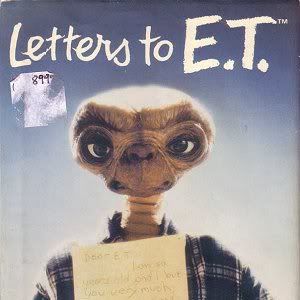
Dear E.T.,
I hope there is going to be a E.T., 2. I loved the movie E.T., it was exciting. I liked when you were riding on the bike, and thanks for not dying.
Your friend,
Jonah
P.S. Next time your in the neiborhood, E.T., phone me.
That awkwardly written yet undoubtedly sincere missive comes from a book called Letters to E.T. (Putnam, 1983), a slim volume which I was fortunate enough to locate in a dusty, cluttered second-hand bookshop in Chicago last May. The book, a somewhat hastily assembled collection of fan mail and fan art, is a quaint souvenir of the E.T.-mania of 1982 and 1983. I remember that mania well, as I was swept up in it like most kids my age at the time. You can bet that there were some E.T. toys under the Christmas tree in the Blevins household back in December '82. I had the leather-skinned E.T. doll (now an eBay item) and a little plastic replica of the film's young hero, Elliott, riding on a bicycle with his alien friend, E.T., wrapped up in a blanket in the bike basket.
It's hard to say what place E.T. The Extra-Terrestrial holds in pop culture today. The film currently rates a 7.9 at the Internet Movie Database and does not appear on that site's Top 250 list, though it does occasionally merit dutiful inclusion on those meaningless G.O.A.T. (greatest of all time) lists released by Entertainment Weekly or the American Film Institute. It did reign for several years as the all-time box office champion, but such records do not and cannot last. (And then there are always those people who want to bring up inflation and rising ticket costs.) Perhaps because it was not the beginning of a multi-film/multi-media franchise and does not afford nostalgic adults the opportunity for elaborate dress-up games (as does Star Wars), E.T. now occupies an ever-shrinking space in the public's imagination. If anything, the movie might seem to be just another corny relic of the fad-happy 1980s, the cinematic equivalent of moonwalking or the Rubik's Cube -- fun at the time but something we've outgrown as a society.
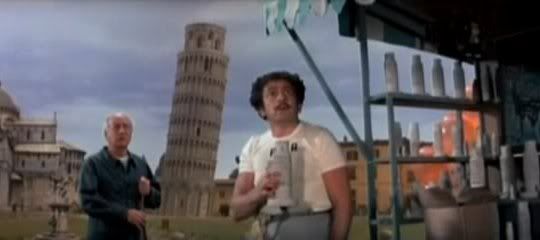
"Never underestimate the power of computers." - ROSS WEBSTER
Superhero movies have been with us almost as long as there have been superhero comics. In the early days, they echoed the comic book format by being made in the form of serials which told the open-ended tales of heroes like Captain Marvel, Batman, Captain America and Superman, who incidentally was the subject of the first full-length superhero movie, Superman and the Mole Men, in 1951. Beyond that, stories about men in capes and costumes seemed better suited to the small screen, where the Adventures of Superman flourished in the '50s and a campy take on Batman did the same in the '60s, itself spawning a big-screen adaptation. Then came the '70s, which saw more TV series like Wonder Woman and The Incredible Hulk and insufficiently funded TV movies like The Amazing Spider-Man, a pilot that led to a short-lived series, and non-starters like Dr. Strange and Captain America which were decidedly underwhelming on the level of spectacle.
The main problem with these productions was, with their limited TV budgets, none of them could hope to duplicate the feats that their characters regularly did on the page -- at least not without looking totally ludicrous in the process. Then came 1978's Superman: The Movie, which showed that all you had to do was spend a little money (a little being roughly $55 million) and you could believe that a man could fly. In the wake of fantasy and science fiction blockbusters like Star Wars and Close Encounters of the Third Kind, Superman showed that comic book heroes also had a place at the table, even if the man from Krypton was pretty much the only game in town for the next decade. In the meantime, there were sequels (and money) to be made and since original director Richard Donner was out of the picture, having burned his bridges with producers Alexander and Ilya Salkind and Pierre Spengler, they needed to find a substitute and fast.
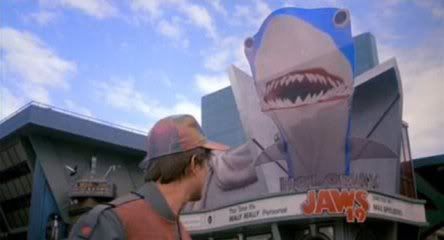
"There's something very familiar about all this." - BIFF TANNEN, AGED 77
Roger Ebert defined a sequel as "a filmed deal," and it's amazing how accurately the truly odd Back to the Future Part II reflects that definition. The supplemental materials on the movie's DVD are surprisingly candid in laying out why the movie exists and why it took the form that it did. When the first Back to the Future was released in 1985, it was anything but a sure thing. The film's star, Michael J. Fox, was not a household name yet, and the film's co-creators (Robert Zemeckis and Bob Gale) had failed to attain mainstream success with their two previous films, I Want to Hold Your Hand and Used Cars. Worse yet, the Zemeckis/Gale-scripted 1941, directed by Steven Spielberg, had been a financial disaster for Universal Pictures. So another Zemeckis/Gale comedy with Spielberg as producer was a risky proposition. In fact, the film could easily have turned out to be another embarrassing boondoggle for Universal.
But, of course, the first film was a massive worldwide hit, the top-grossing American film of 1985. A sequel was inevitable, and Universal informed Zemeckis and Gale that one would happen whether they were involved or not. So they were now "locked in," so to speak, as were most of the members of the first film's cast. Strangely, though, it was the holdout of one of the supporting players, Crispin Glover, that provided the catalyst for the sequel's plot in which his character (loveable nerd George McFly) is mysteriously killed off, creating another "time travel" problem for the heroes, Doc and Marty, to solve.
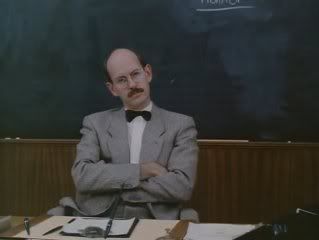
I don't think I'm making any kind of an Earth-shattering revelation when I say that I was a comedy junkie for most of the '80s. I didn't distinguish between good comedy or bad comedy, high or low humor; if it meant to be funny, I would watch it. This is why, in addition to the collective works of Zucker-Abrahams-Zucker, I've also seen movies like Morgan Stewart's Coming Home multiple times and Johnny Dangerously was considered must-see viewing in the Clark household whenever it came on television, which was often. ("You shouldn't hang me on a hook, Johnny. My father hung me on a hook once. Once!") The holy grail for me, though (until I saw Monty Python and the Holy Grail, that is), was just about any film that starred an alumnus of Saturday Night Live -- despite the fact that I was too young to stay up and actually watch Saturday Night Live at the time. The ones that I gravitated to the most were Dan Aykroyd, John Belushi, Chevy Chase and Bill Murray, the breakout stars of the original cast who had gone on to great success (individually or in various pairings) in films like Animal House, The Blues Brothers, Caddyshack, Stripes, National Lampoon's Vacation, Trading Places and Ghostbusters. Sure, not all the movies they made were gems (Modern Problems, anyone? If not, would you prefer a house call from Doctor Detroit?), but I watched them regardless. As long as they made me laugh once or twice, I wasn't too particular.
If I respected any one of them more than the other four, it was definitely Dan Aykroyd, largely because he had a hand in writing many of the films he was in, which I felt gave him a leg up over the likes of Chevy Chase, who seemed to be content to do whatever happened to come his way. (This is how a misfire like Under the Rainbow happens.) When the two of them teamed up for 1985's Spies Like Us (which Aykroyd conceived with the original intention of co-starring with Belushi), I was delighted to finally see how they would play off each other. (I didn't get to see any of their work together on Saturday Night Live until years later, so as far as my 12-year-old mind was concerned, Spies Like Us was the first meeting of their comedic minds.) And while I had yet to become a full-blown auteurist, I was aware that the director, John Landis, had also been the guiding force behind Animal House, The Blues Brothers, Trading Places and the first segment of Twilight Zone: The Movie (the prologue for which had featured Aykroyd). In short, I was ready-made to love Spies Like Us and love it I did. I even bought the 45 of Paul McCartney's theme song, which in all fairness shouldn't be considered an indication of its quality. After all, for a time I was also the proud owner of the single "City of Crime" from the movie Dragnet. (I'm sure that's something Tom Hanks would like to wish out of existence.)
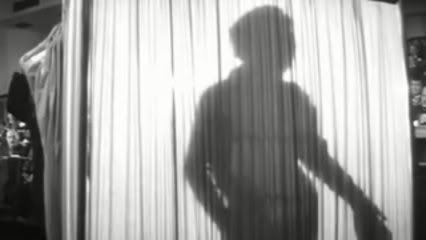
(NOTE: I am going to kill the suspense immediately by telling you in the first sentence that I loved this film and watched it twice just in the process of preparing for this review.)
In case you haven't figured it out, Craig and I have been alternating movie picks for this project. (Yes, I am the one who selected Killer Klowns from Outer Space. Insisted on it, really. I don't remember why.) For my second pick, I wanted to choose something more prestigious because, after all, this is Oscar season. When I thought about respectable, award-caliber movies from the 1980s, my mind immediately went to David Lynch's The Elephant Man, a serious, fact-based 1980 drama whose DVD cover proudly announces the fact that it was "Nominated for 8 Academy Awards." It won none of those, but still... honor just to be nominated, right?
I was first introduced to this film -- no lie -- by Joe Bob Briggs, who showed The Elephant Man as part of his long-gone, much-missed TV series, MonsterVision, in the 1990s. Doesn't showing The Elephant Man on something called MonsterVision kind of miss the whole point? Not exactly. To me, The Elephant Man has the look and feel of one of the old Universal horror films. The ghosts of such Universal directors as James Whale and Tod Browning hover over The Elephant Man.
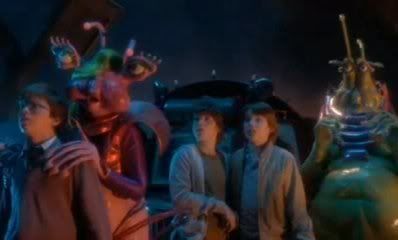
Joe Dante holds something of a rarefied place in film fandom since he's one of the dreamers who was able to break into the industry and put his own fantasies on the screen. He started out by writing reviews of genre films for fan magazines (which were later reprinted in Video Watchdog) and eventually got a job cutting trailers for Roger Corman's New World Pictures, which led to directing gigs like Hollywood Boulevard and Piranha. It was after he went out on his own to make The Howling that he was tapped by Steven Spielberg to direct one of the better segments of Twilight Zone: The Movie (the gonzo reimagining of "It's a Good Life") as well as Gremlins, which was such a major hit that it allowed him to develop a more personal project. That turned out to be 1985's Explorers, a feature-length wish-fulfillment fantasy for sci-fi geeks everywhere.
Best known today for marking the screen debuts of Ethan Hawke and River Phoenix, Explorers is mostly seen through the eyes of Hawke's pop-culture obsessive (obviously patterned after Dante), who gravitates to science fiction epics like War of the Worlds and This Island Earth, much like I was drawn to this film and watched it repeatedly when I was an impressionable young lad. Phoenix is much more down-to-earth, the rational proponent of science fact who is able to translate an image from Hawke's recurring flying dreams (which feature some Tron-like landscapes) into an actual circuit capable of creating a force field that he can control with his 128K Apple computer (an obvious hand-me-down from his computer-scientist father). To complete the trio they enlist gearhead Jason Presson, the product of a broken home who helps build and christen their spacecraft, the Thunder Road, which quite appropriately has a television screen as its main window. This is because when our three young explorers finally make it into space, they find that television has most emphatically preceded them.
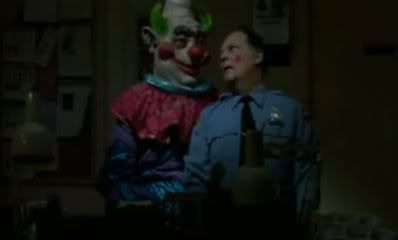
Lots of science-fiction and horror films have been built around seemingly ridiculous high-concept gimmicks, particularly when it comes to totally improbable and impractical monsters. We've had killer elevators, killer laundry-folding machines, killer tomatoes, killer beds, killer penises, etc. What makes Killer Klowns from Outer Space (1988) so special is that the movie fully makes good on the promise of its extravagant title. If you want a rollicking, highly enjoyable movie about murderous extraterrestrial harlequins, look no further.
The Chiodo Brothers -- director Steven and his siblings Charles and Edward -- have worked together and separately on a variety of film and television projects for the last 20 years or so, generally as creature designers, puppeteers, and art directors. (All three toiled on Team America: World Police.) Killer Klowns is the Brothers' one big chance to run amok in a feature-length film, and they do not waste this golden opportunity. The film feels like the kind of thing a group of brothers might come up with in giggly, late-night brainstorming sessions.
STEVEN: So our villains are evil alien clowns, right?
EDWARD: (snorting) Yeah, and maybe their spaceship looks like a big circus tent!
CHARLES: And their weapons are popcorn and balloon animals! (sprays Mountain Dew out his nose)
If the movie can be reduced to a formula, it would be: The Blob times Gremlins minus the actual monsters from those movies minus budget plus clowns plus terrible sweaters plus Dean Wormer from Animal House. That's a lot to absorb, so let me break it down.
Greetings, Unloosen reader(s), and welcome to what promises to be a bright, shining and -- for lack of a better term -- new decade. According to Arthur C. Clarke, 2010 is the Year We Make Contact, which raises the hope that this will be the year that Unloosen reaches a wider readership. To that end, Joe Blevins and I have chosen to set aside the more esoteric fare that we're known for (so to speak) and start reviewing movies people have actually seen. And so we have settled on the storied decade known as the '80s, one which is beloved by countless VH1 commentators and is known for any of a number of high-profile motion pictures. Just don't think we're doing this out of some misplaced sense of nostalgia. Sure, most of the films that we plan on writing about on a biweekly basis (starting this Thursday) are ones that one or both of us saw -- in some cases, multiple times -- during our misspent youths, but we intend to look at them afresh with critical eyes. Will Johnny Dangerously be as funny as I thought it was before I reached puberty? Do the special effects in Weird Science hold up after two and a half decades? And does one really need to sit through Ghandi more than once in a lifetime? Stay tuned to find out.
EDITOR'S NOTE: To bring "Project: Fear Itself" to a fitting conclusion, Craig J. Clark ventured to the Northwest suburbs of Chicago in order to view the final episode, "The Circle," with Joe Blevins in person. What follows is a transcript of their post-show conversation.
Craig: So...
Joe: Sew buttons.
Craig: Yeah. And to think I drove all the way up here from southern Indiana for that.
Joe: Hey, it's better than what Johnathon Screech or whatever came up with for the screenplay to "The Circle." Wait, is it a screenplay? Isn't teleplay the word?
Craig: It is, and I actually was talking about the teleplay. And the guy's last name is Schaech, by the way, and he's not the only one responsible for this mess of an episode. His writing partner Richard Chizman (although Cheeseman might be more appropriate) is equally to blame.
Joe: I guess I was thinking of "Screech" because "The Circle" was roughly as scary as an episode of, let's say, Saved By the Bell: The College Years. Actually, not quite as scary. The people in this episode only had to deal with glum trick-or-treaters and this big wall of ink outside their remote cabin. They didn't have to face Dustin Diamond or Mario Lopez. That would have been more terrifying.
"Pinch hitting for Pedro Borbon... Manny Mota... Mota... Mota..." - ROBERT HAYS
"You ever have really strong déjà vu?" - AARON STANFORD
If you'll permit the indulgence, before I get to "Echoes" -- the penultimate episode of Fear Itself -- I feel there's something I have to get off my chest. I'm beginning to worry about Joe. I hate to say it, but I think this project may have finally broken him.
Remember last summer, when his Fear Itself reviews contained wild flights of fancy about kinky senior citizens and improbable trips to Morocco and so forth? Well, look at them now. For the past few weeks my colleague has done little more than morosely catalog each ensuing episode's shortcomings (of which, it must be said, there have been many) and throw in an off-hand reference to the Coen Brothers or Bugs Bunny and call it a day. What happened to the bright young Mr. Blevins who would use the tools of satire to extol the virtues of nepotism in the entertainment industry or write an entire installment as if he were Marty McFly addressing the president of NBC? Sadly, I fear the will to sustain such an elaborate construct has been beaten out of him by the paucity of creativity on display in the show itself, which begs the question: Is this what we were supposed to fear? Not fear itself (or even Fear Itself), but rather the dulling of the imagination? Maybe so, maybe so...
While watching "The Spirit Box," yet another previously-unaired episode of Fear Itself, I could not help but hearken back to the convoluted origins of one of America's favorite cartoon characters, Bugs Bunny. The mischievous rabbit was not the creation of any one man, though several directors at Warner Brothers have taken credit for him over the years. Instead, everything we know about the character -- his name, his appearance, his personality, his trademark comedy bits -- took shape over a number of cartoons released between 1938 and 1940. Even Bugs's deathless catch phrase was a collaborative effort. Bob Clampett came up with the first draft -- "What's up, duke?" -- which Tex Avery would later refine to "doc." Years later, talking to a biographer, Avery would remark on the effect the phrase first had on audiences: "They expected the rabbit to scream or anything but make a casual remark. For here's a guy pointing a gun in his face! It got such a laugh that we said, 'Boy, we'll do that every chance we get.'"
"Watch your head." - SOME CANADIAN GUY WEARING A POLICE OFFICER'S COSTUME
With the current state of the economy, it was only a matter of time before Fear Itself got around to addressing the housing crisis, and it did so somewhat obliquely with "Chance," a story about a couple in danger of losing their home when they get three months behind on their rent due to financial mismanagement. Of course, if the episode had aired last summer as originally planned it probably would have seemed a whole lot more timely and maybe even a little prescient. After all, haven't we as a nation been taken for a ride by a crooked antiques dealer (read: the federal government) who got us to sink our life's savings (read: billions of our tax dollars) into a shady deal (read: the Wall Street bailout) involving a rare, 16th-century vase? (Okay, that's where my metaphor breaks down, but you get the point, right?) As it is, "Chance" will have to make do with being slightly behind the curve, but that's not such a terrible place to be. It's better than being behind the eight ball.
"Hegel remarks somewhere that all great, world-historical facts and personages occur, as it were, twice. He has forgotten to add: the first time as tragedy, the second as farce." - KARL MARX (1852)
"Reunited and it feels so good." - PEACHES & HERB (1979)
And so we meet again, Fear Itself, under circumstances neither of us could have foreseen. It's been a while, my erstwhile muse. Have you lost weight? Or do you just look smaller because now I'm watching you on the Internet? The last time we met, of course, you were on the National Broadcasting Company. Then you lost your coveted network time slot to the Beijing Olympics and completely dropped out of sight. I heard not long ago, you were peddling yourself on DVD, all dolled up in a cheap plastic case bearing the image of what appears to be a skeleton with priapism. How sad! I don't know how that turned out for you, but now here you are streaming for free on the FEARnet website.
The move suits you. These new, more humble digs are just your style. Let's face it, NBC was no kind of a home. It was an untenable situation from the get-go. Audience members have certain baseline expectations for network television, expectations you could never hope to match. But on the Internet, all people expect is to see idiots getting hurt, and that's something you've always been able to provide, Fear Itself.
Well, it just goes to show you can't get a good project down. As I write this, it has been close to 15 months since NBC took ratings-challenged horror series Fear Itself off the air in favor of the Summer Olympics (who are the programming wizards who made that decision?) and almost as long since Joe and I reviewed the putrid horror anthology Trapped Ashes as a way of sustaining interest in "Project: Fear Itself" until the Olympic Games were over and the show could be returned to the schedule. Alas, this was not to be for the five unaired episodes remained in NBC's vaults despite the perfect opportunity to burn them off that October, which by happenstance had five Thursdays in it (just as it did this year). It seemed we would have to wait for the inevitable DVD release to finish what we (and NBC) had started, which brings us to now.
Editor's Note: Since NBC's Fear Itself is on hiatus during the Summer Olympics, Joe Blevins and Craig J. Clark have taken it upon themselves to review the direct-to-video horror anthology Trapped Ashes, which was released on DVD in July, as a stopgap measure. Their observations follow.
My fellow freedom-lovers:
Let me set the scene for you, citizens. It's Friday night [August 8 -ed.], and I'm sitting on the couch in my apartment watching a movie called Trapped Ashes. Screwy title, huh? Sounds a bit like Slapped Asses, which would also be a pretty screwy title but would not sound quite as gloomy and high-toned as Trapped Ashes. I'd been watching the Opening Ceremonies from Beijing earlier in the evening, but the Parade of Nations soon got to be monotonous, a seemingly endless procession of people dressed up like Century 21 agents, smiling and waving to the crowd in the manner of hometown beauty queens. Snoo-zers! So I succumbed the siren song of Trapped Ashes, which comes billed as a gore-riffic horror anthology, just the thing to substitute for my beloved AWOL Fear Itself. Anyway, the disc starts with previews, and normally I would automatically skip those but I figure, "What the hell? All the better to recreate the true experience of seeing a real movie in a real theater. Let the trailers commence!"
I have a confession to make. This is very difficult for me because I'm a very private person by nature, but my sponsor tells me that the best thing for someone in my position to do is to come clean, so here goes:
My name is Craig, and I am a werewolfoholic.
"This is no longer a vacation. It's a quest. It's a quest for fun." - CLARK GRISWOLD
Doc!
Doc, you gotta help me!
It's this TV show, Doc, this Fear Itself. Yeah, that's right, Doc, the NBC horror anthology airing Thursday nights at ten, nine central right after Last Comic Standing. Boy, you sure know your TV shows, Doc. I didn't think anybody but me was watching... and judging from the ratings they ain't. So you been watching it too?
Oh, just heard about it somewhere, huh? Still, I'm impressed.
Anyway, Doc, here's my problem. I've been watching this turkey since day one. Day one, Doc, and I ain't missed an episode yet. Loyal as Greyfriars Bobby, you might say. And what do I get in return, Doc? Zilch, that's what. Zero. Nada. Nothing. El blank-oh.
What do I want from it? How about a genuine scare every once in a while! The title is Fear Itself but I haven't experienced any actual fear itself. Boredom itself, yes. Disappointment itself, definitely. Confusion itself, frustration itself, curiosity about what's on the other channels itself, you name it. Everything but fear itself. I want the fear, Doc. I crave it like the junkie craves his needle. You grok, Doc?
I hate being lied to. Maybe I'm simply too trusting in general, but when I see something in a film or a television show I like to think that it happened the way it was depicted (unless, of course, the event takes place in an obvious dream or fantasy sequence, in which case I'm more than willing to give the filmmakers [or telefilmmakers, as the case may be] the benefit of the doubt). The one thing I can't stand is when I'm led to believe one thing for 55 minutes (or 85 minutes or 235 minutes) only to have the rug pulled out from under me in the last five. (That being said, if somebody did make a four-hour film that relied on a twist ending, I would have to grudgingly admire him or her for having the balls [or ovaries, as the case may be] to try it even if I still ended up hating the film itself.)
"We're off on the road to Morocco / Well look out / Well clear the way / 'Cause here we come" - BING CROSBY & BOB HOPE (1942)
You can buy just about anything in Marrakesh, anything you can name. By day, the tourists -- their thick necks glistening in the relentless Moroccan sun, the backs of their knees moist with afternoon sweat -- haggle with the shopkeeps over jewelry, drugs, and gray-market electronics in the large, open-air souk. But by night, when the day-trippers and sightseers are safely tucked away in their overpriced hotels, Marrakesh becomes something different altogether. Call it Hell's own strip mall. That's when the bargains really start flying. You say want a man killed? Fifty dirhams, please. His head brought back to you on a platter? That'll be five extra. (Ten if you're a traditionalist and insist on a silver platter.) A government overthrown? Right away, sir. I think 200 dirhams should cover it. Cash up front, of course. Your Discover card's no good here.
I don't know why I got my hopes up about this week's Fear Itself. Maybe it was because I had actually seen some of director John Landis's previous work and liked it very much. Sure, before the Masters of Horror series came along a couple years back he didn't have that many horror credits to his name (unless you count 2 1/4 as "many"), but An American Werewolf in London is a classic of the genre and is, in my estimation, one of the best werewolf movies ever made. I confess that I have yet to see either of Landis's Masters of Horror episodes, but I certainly hope they're better than "In Sickness and in Health," which probably could have used a werewolf or two to spice it up.
As usual with this series, the problems start with the script and this one just so happens to have been written by Victor Salva, the writer/director of the Jeepers Creepers movies and a convicted child molester whose work I've managed to avoid up until now. I'm not saying he's incapable of making scary movies because of his checkered past (quite the opposite, in fact), but some people simply don't need to be encouraged. And if this teleplay is any indication of his talents, he won't be. Who knows? He may have the great American pedophiliac werewolf story inside him, but who's going to want to get it out of him?
Attentive readers will recall from last week's article my harrowing ordeal at the hands of alleged thespian Eric Roberts via his televised appearance in last week's episode of Fear Itself. What I neglected to include in my review, however, was the aftermath of this shameful incident. Apparently, in an Roberts-induced state of delirium, I began wailing and howling in a manner more befitting an animal than a man, and these odd vocalizations of mine were audible throughout the apartment complex in which I currently reside.
I was, as they say, "pretty far gone" by the time the local police knocked on my door to make inquiries as to my safety and sanity. These law enforcement officials were responding to a 911 call made by my neighbor, an elderly widow named Viberta Wigfall. Fortunately, Mrs. Wigfall is one of my oldest and dearest friends, and her call to the police was merely an act of motherly concern rather than one of spite or malice. Regaining my composure under these admittedly embarrassing circumstances, I managed to convince both the police officers and Mrs. Wigfall that everything was perfectly all right, and we all adjourned to our respective dwellings.
After last week's dismally derivative "The Sacrifice," the horror anthology series Fear Itself bounces back with a sophomore effort that is a refreshing change of pace. Far from your ordinary haunted house story, "Spooked" is a touching drama about a damaged man coming to terms with a tragedy in his past. Of course, as a sop to the show's presumptive fan base it has to couch its hard-won emotional revelations in supernatural terms, but it's no less effective for that.
From greatness comes greatness. From gods come gods. As Dionysius sprang from the loins of Zeus, so Breck Eisner sprang from the loins of Michael Eisner, and we the viewing public are all the luckier for that fact. While Eisner the Elder's triumphs are many and myriad, it is of the younger Eisner I now write, for it is he who directed "The Sacrifice," the inaugural episode of Fear Itself, a new horror anthology series currently airing on the National Broadcasting Company. Reader, I tell you, a more stirring curtain raiser this series could not have asked for. "The Sacrifice" is beautiful and grotesque, a phantasmagoria of horrific delights for all five of the senses. If there were any lingering doubt even after Sahara, "The Sacrifice" proves that Breck Eisner is a master. This episode is a masterpiece, truly a master's piece.
In order to drive year-end holiday sales and seem important, every music critic on the face of the Earth releases a "best of" list in mid to late December. I'm not a music critic and, according to my Mom, I'm already important, so I'm delivering my Best Music of 2007 now, at the near-end of January 2008. A good deal of you know of my level of music appreciation and some of you have even requested knowledge of my favorites, so here it is, a gift from me to your ears:
(NOTE: I've included links to buy the albums via Amazon, which, if used, earn minor cash for Unloosen. Use this resource as you see fit.)
Official Unloosen Album of the Year:
Spiderman of the Rings by Dan Deacon
The only album I can wholeheartedly recommend to 90% or more of the Unloosen-consuming public also has what is known far and wide as the greatest album title of 2007. Dan Deacon's Spiderman of the Rings is a Casio-borne kaleidoscope of sound, a perfect union of fun and insanity which must be heard to be believed.
Greg, don't let this happen to you. Seriously.
On a scale of 1 to Club 11, 40 Year Old Virgin gets a 7.
I have mixed feelings about this film. It’s a nice documentary, but there’s not much of a “movie” feeling to it. If you watch the National Geographic Channel on a big TV it’s nearly the same experience. Also, the pacing is intentionally deliberate. It’s understandable, but that allows my mind to wonder. I couldn’t stop thinking of the poor cinematographer who froze off his junk just to bring me the mating ritual of a beanie baby I once had. I also couldn’t help but wonder what the hell I was doing in that theater. What has happened to me? I used to enjoy things as men do. Yet, I just paid money to watch some French guy’s interpretation of penguins getting it on. That’s not good. Tonight I'll be drinking beer while watching porno. Don't want to turn queer. DE-FENSE! DE-FENSE! On a scale of 1 to Club 11, March of the Penguins gets a 7.
My wife thinks Johnny Depp is dreamy. In Charlie and the Chocolate Factory, I think he looks like Captain EO. In spite of his appearance, Depp puts together another interesting performance, and Tim Burton (also in spite of his appearance) has given us a visual feast. Unfortunately, it just doesn’t have the same subtle insanity of the original. On a scale of 1 to Club11, Charlie and the Chocolate Factory gets a 7.
I’ve taken some heat recently for my review of Batman Begins. Some believe that I should take a more in-depth look at films rather than spew a rant. For those who share this opinion, bite me. I don’t feel the need to explain my art to you.
The only reason I bring this up, is because War Of The Worlds is so completely uninspiring that I don’t even have the passion for a rant. Your disappointment is tasty.
Spielberg has made another movie that starts well and goes nowhere (Saving Private Ryan, A.I., Minority Report...), and Tom Cruise has made another movie in which he runs. At least I wasn’t expecting much going into the theater. I was just hoping that it would be fun. It wasn't. If you’re going to make a disaster flick, at least make it fun.
On a scale of one to Club 11, War Of the Worlds gets a 4.
Who says Hollywood is in a slump? With Batman Begins the studios have outdone themselves. They didn’t just create a gay ninja flick. No, they figured out a way to make it a comic book prequel horror action movie with bad dialogue that only started as a gay ninja flick. Watching this convoluted piece of crap is one of the most unpleasant three hours I’ve spent in years, including my colonoscopy and Lord of The Rings. The theater was packed with chatty couples, crying babies with pagers, and morons laughing at the fodder (I hate people). But even with all of that, the movie was the worst part. It was that bad.
The acting and direction were fine, but the story and script were such a bastardized mix of focus group crap that it was well beyond saving. And the worst part was that I was expecting a good movie. The critics, and even some of my EX-friends, said this was an interesting character piece. Shame on you! I went in expecting a thoughtful journey into a tormented soul and I left with only a headache and a loathing for mankind. All I’m saying is don’t promise me the world and then dump on my face. On a scale of 1 to Club11, Batman Begins gets a 3.
We Star Wars fans have tried so hard to hide our disappointment over Episodes 1 & 2 that we’ve actually convinced ourselves that they didn’t suck. I even dishonored Club 11 by giving them positive reviews. For this, I am deeply sorry. I couldn’t help myself. I have no objectivity when it comes to Star Wars. I grew up on the originals and I wanted to be Luke Skywalker (and then Han Solo when I started growing pubes).
Today was my liberation day. I can now admit that the last two movies blew the solar wind because Lucas has finally delivered a film worthy of the "Star Wars" name. Episode III is dark, unrelenting, and heartbreaking. Most impressively, even with the end of the story exposed over 25 years ago, the film never once loses its intensity.
Unfortunately, Episode III is not without its faults. It still has some painful Lucas dialogue and a Frankenstein scene that makes one cringe. Yet, after the last two crapathons, the faults of this episode seem minor.
I can see why those with no attachment to Star Wars may not like this film. Obviously, they are all dirty communists and have no valuable input for our society. Any true American Star Wars fan will be happy and relieved that Lucas finished the series with a classic.
Living up to the expectations of dorks like me may have been the greatest challenge of Lucas’s career. It is now his greatest accomplishment. Thank you George. Thank you for having the balls to make everything right again. And thank you for making sure that 30 year old virgins can blame a woman for all of the problems in the Universe. BEST PREQUEL EVER! On a scale from 1 to Club 11, Star Wars: Episode III: Revenge of the Sith gets a Club 11.
I know that my 5 or 6 loyal readers are hoping for me to make a glorious return to Club 11 by blasting some piece of self important crap. Unfortunately, I have grown since the days of Pork Pony. Years of domestication have chilled my hostility, and I no longer subject myself to movies that I know will make me vengeful (I now have politics for that). As a result, I don’t see many movies.
Fortunately for Club 11 fans, I never watched most of the movies that I reviewed anyway. Do you really need to see Hope Floats to know that it sucks? Also, my tremendous ego is still alive and well. I continue to believe that all films should be tailored to my individual tastes.
In this instance, if you want me to enjoy a movie with characters that have supernatural powers, it needs to be either silly or foreign. Kung Fu Hustle mixes the two, and therefore touches me deeply. It has all of the ass kicking fun of the original Matrix movie with none of the sci-fi loser crap. It’s heavenly. It also gives new meaning to the term “palm maneuver.”
Those of you waiting to hear me go off on the flavor of the month will have to wait until the ripe summer season. On a scale of 1 to club11, Kung Fu Hustle receives a Club 11.
I really didn't like the opening credits of this movie. They were kinda dull and had no stylistic relevance to the story. There's nothing I hate more than starting a train of thought and then dropping it for no apparent reason.
Signs is the type of film that Hollywood rarely makes anymore. It takes a simple approach to a complex issue, relying on pacing and acting rather than explosions and bootie. Not that there's anything wrong with either explosions or bootie, its just a nice change of pace.
Without ruining the ending of the film, don't go into the theater expecting The Sixth Sense. I was afraid that M. Knight Whatshisface was going to go all "queer" on us (industry term) and pull out some ridiculous ending. Instead, he relies on the subtleties of the films message to resolve the story. It may not be the ending that you want, but it's nice to know that he isn't just "yankin' your crank" (non-industry term). On a scale of 1 to Club11, Signs gets an 8.
The first 1 1/2 hours rocked! It had great action, an interesting story, and wonderful direction. It was Speilberg at his best. Unfortunately, he cocked it up.
Instead of making a dynamic story from a complex issue, Speilberg "dumbed down" the last 45 minutes to make it accessible to the cinematically challenged. I'm sure that this approach helped him at the box office, but people who love movies will be disappointed.
When you turn subtext into dialogue, you've taken the easy way out. Speilberg knows this, making the film all the more upsetting. When a great story is made into an average film, it's a failure no matter how much money it makes. On a scale of 1 to Club 11, Minority Report gets a 6.
This movie was so uninspiring that I don't even have anything clever to say about it. I loved the first MIB, but the sequel seemed more like a parade of action figures than a coherent story. Will Smith put together a good performance, but he had absolutely no help. The characters were flat, the story was muddled, and film felt like a collection of meaningless scenes.
The trailers made this film look like it would at least be a lot of fun. Unfortunately, it was a tremendous bore. If they continue this saga, I sincerely hope that they focus more on the relationship between "J" & "K" and less on marketing toys with nuts on their chins. On a scale of 1 to Club11, MIB II gets a 4.
If I were still in 8th grade, this would be the greatest movie ever made (other than missing a gratuitous boobie shot). Austin 3 is filled with more disgusting humor than the first two movies combined, and not five minutes go by without a dick or fart joke. Obviously, I liked it a lot. Don't get me wrong, but this film won't win any awards that aren't distributed by MTV. The new villain, Goldmember, sucked and the story wasn't anything special... but damn it if I didn't laugh a lot.
Austin Powers 1 was a great movie. Austin 2 was fun, but it failed at trying to be like the first movie. Austin 3 is just plain retarded. Not bad retarded, good retarded. By not sticking to a coherent story like the first film, the Austin Powers series has reinvented itself. Mike Myers is a genius, and I'll gladly give him my $8 every couple of years to feel like a stupid kid again. On a scale of 1 to Club 11, Austin Powers: Goldmember gets a 7.
From the makers of Fried Green Ovaries and Snow Falling On My Fallopian Tubes comes the new menopausal thriller, The Divine Secrets Of Ya Ya Sisterhood. Ladies, please don't ask your men to see this movie. Men, if you see this film, there are some things to be careful of: you may feel an uncontrollable urge to lay an egg. You may begin to crave pickles or chocolate. You may even begin lactating on your inner child. All of these symptoms are normal for a man forced to watch this crap.
I don't care if this movie is good. It's obviously not meant for me or anyone else who doesn't feel a pressing need to give birth. On a scale of 1 to Club 11, The Divine Secrets Of Ya Ya Sisterhood gets an egg-shaped 0.
The dryer at my apartment is a piece of shit. It takes at least two cycles to dry one load, and they raised the price to $.75 a cycle. That's $1.50 to dry each load! Worse still, since I ran it more than twice in one day, it began to smoke. My entire wardrobe now has a mesquite flavor that is hard to ignore. Tomorrow, I have to re-wash my clothes at the laundromat. On a scale of 1 to Club 11, Juwanna Mann gets a 4.
Ba baaa, ba ba ba Star Wars ba ba ba Star Wars ba ba ba baaaa. As a 25 year old male, I'm required to give any Star Wars movie a Club 11 rating (yes, even Episode I). No matter how bad it is, I will love it. Fortunately, this film is actually worth seeing even for a casual Star Wars fan.
Episode II does have many of the same flaws as the other four movies. Mainly, the dialogue is awful. Also, Lucas isn't helping his virgin following with the ladies. Even fans who haven't had a date since Episode I will roll their eyes at how awkward this romance becomes.
Even with it's obvious problems, Episode II is still a kick ass flick. First of all, Yoda is an intergalactic pimp! There's no longer a question as to why he runs the show. Also, the art direction and set designs are some of the best that I have ever seen. Most importantly, however, Episode II isn't afraid of it's dark side (pardon the pun). The story is complex, and many of the characters show depth that is often missing from Star Wars films. If you can get through the nerdy dialogue, you will begin to see how well crafted the entire Star Wars saga really is.
After Episode I, I my expectations for the new trilogy plummeted. After Episode II, however, I now believe that the final Star Wars film, Episode III, may also become its best. On a scale of 1 to Club 11, Star Wars Episode II gets a mandatory Club 11.
Boy, that rain sure was cold. On a scale of 1 to Club 11, Spider-man gets an 8.
There isn't much to say about this film. It's Kevin Smith, it's very self aware, and it has a five minute long set up for a fart joke. If you can appreciate that, then your Citizen Kane has finally arrived. For added enjoyment, see it with your parents and watch them weep for your soul. On a scale of 1 to Club 11, Jay and Silent Bob Strike Back gets a 7. Bong!
Since I can't bring myself to pay $9 to see Blade II, I'm going to begin renting movies that I might actually enjoy reviewing. Hopefully, these intermittent older reviews will help us all get through another long summer of crappy movies.
The first movie that I rented was Magnolia, a film that shakes the Club 11 rating to it's core. I want to give it a "9" because it's extremely well-done. The acting, directing, cinematography, and comedic timing are all phenomenal. With the exception of the character relation between the little boy and his father, I felt that this movie was flawless in it's execution. However, I also want to give Magnolia the first Club 11 "0" because it is absolutely pointless. People are dying, abused, and unhappy, and we get to watch for three hours. Surprisingly, it's not as much fun as it sounds.
For whom was this movie made? If you don't already know that horrible things happen in this world that affect the way people act, then chances are that you're not bright enough to tie your shoes, let alone appreciate this style of filmmaking. Strap on your protective helmet, put your head on your desk, and check out for the next 30 years because you are a moron. Also, if you are an intelligent person who enjoys spending three hours basking in the misery of those who have been subjected to a lifetime of abuse, then you too should wear a helmet. This will help to protect you from the thorough beating that you so very much deserve.
Ultimately, Magnolia proves my theory that some art is just stupid. After watching this film, Blade II is actually starting to sound pretty good. On a scale of 1 to Club 11, Magnolia is pointless.
Honestly, you couldn't pay me to sit through this movie. Instead of jiggling her hooters in front of a giant neon Pepsi sign, Brittany Spears is shaking her self worth on the big screen. Why pay for the cow when she exposes herself for free? Besides, we all know that pop music movies reached perfection with Disorderlies, and, despite the title, Bone Thugs and Harmony have nothing to do with the musical score.
The release of Crossroads does, however, allow me to discuss a very important theory. Brittany Spears is not human. I assure you, the evidence is overwhelming and can no longer be ignored.
1) Alien eyes. If you take a good look at a close up of Brittany's eyes (yes, she has eyes), you will see that they are spaced very far apart. When superimposed against the cover of that Communion book, the theory begins to take shape.
2) The Magical Mystery Boobs. If you were going to send an alien to take over a planet, wouldn't you do it with a saucy temptress? Spears is a pop star with boobies that magically switch from an "A" to a "C." In her videos, she's packing heat, but in the previews for Crossroads, there is a profile shot of Brittany in a bikini where she is melonless.
3) The word on the street. I'm not the only one who knows that something just isn't right with Brittany. While shopping at Target one day, I passed a young girl who was being scolded by her mother. "I don't want to hear you call Brittany Spears a whale penis ever again!" shouted her mother. I salute that young girl for her bravery in questioning the status quo.
Whether Spears is a whale penis or an alien, I will continue to fight for the truth. On a scale of one to Club 11, Crossroads gets a 2 (one for each of it's stars).
Bone bone bone bone bone, bone bone.
Finally, someone tackled the difficult subject of early 1900's British snobbery. I'm not really sure if British food or British humor is more plain, but strangely enough, I'm drawn to both.
Gosford Park is kinda like Clue on quaaludes. It is a beautifully made mystery with enough plot twists to keep you interested (and slightly confused) until the very end. Maggie Smith is brilliant, and Robert Altman does a wonderful job of directing. Not only is Altman's mastery of character development very impressive, but he is also able to use the word "fag" in a completely innocent way. What an auteur. On a scale of 1 to Club 11, Gosford Park gets a 9.
I know that everyone will be disappointed, but I don't have anything bad to say about Moulin Rouge. I have a massive film ego, so I'm always impressed when I see a film that I'm not talented enough to make. Baz Luhrmann did an amazing job, and I feel very strongly that he should have been nominated for a "Best Director" Oscar.
I'm not even gay and I loved this musical. The explosion of color, music, & Shakespearean tragedy was enough to leave me awestruck. I think that my friends said it best when they described the experience as being hit over the head by a loud velvet hammer. That may sound odd, but anyone who has seen the film knows exactly what they mean. Hopefully, for the sequel, they will throw in a little P. Diddy and possibly the "Hey Mickey" song. On a scale of 1 to Club11, Moulin Rouge gets a CLUB11.
I'm not sure, but I think that this movie has something to do with Dawson. On a scale from 1 to Club11, my sister gives A Walk To Remember a 6.
Neeeeerrrrrrrrrdddddddssssss! Will somebody just throw the friggin' ring into the volcano and end this damn thing! I hated this movie with a passion that I rarely feel for movies. I even hated the people in the theater who didn't hate it. I felt like I was being forced to watch that Marines commercial for about three hours, and I was actually praying for a game of Magic to break out so that I'd have something else to watch.
I know that 2001 sucked in every way imaginable, but I honestly can't believe that this film is being recognized as one of the best films of the year. How hard was it to tell this story? Didn't anyone see a pattern? A) Computer generated landscape of Dorkville B) Discussion about how we are torn between loving and hating the ring C) Fight scene Repeat for 3 damn hours.
Since I hadn't read any of the books prior to seeing the film, Lord of the Rings offered me nothing for the first 2 1/2 hours. I never cared about the characters because I never got a chance to know them. All conflict seemed to be predetermined by the evil of the ring. It wasn't until the final half hour that characters made choices of their own free will, finally allowing us a glimpse at their true nature.
This film, however, did have several laughs. The fact that the wizard's only power seemed to be to tell everyone to "run" was very amusing. (Honestly, he gets his ass kicked by another old wizard, runs away whenever there's danger, and when he finally did do some magic, his cane turned into a sparkler. Big freakin' deal.) Also, because this movie had more glory shots than your average porno film, I found the redundancy of these sweeping shots to be very amusing by hour three. But the funniest moment in Lord of the Rings had to be when Frito Bag got stabbed for the second time and they show his reaction in slo-mo. I swear, it looked like the dwarf was taking a dump. On a scale of 1 to Club11, Lord of the Rings gets a 3.
Why is playing a SPED the key to winning an Oscar? How hard can it be? I talk to myself all the time. Also, will somebody please tell Opie to stop spinning the damn camera! When you rotate the camera in back to back scenes, it's not dramatic, it's annoying.
Ultimately, A Beautiful Mind is a good movie that pissed me off. It has great acting, beautiful music, and a really interesting subject. But instead of taking risks, it relies on standard story conventions to tug at your heartstrings. As a result, it gets sappy, repetitive, and it oversimplifies what must be a horrible affliction.
Russell Crowe was much better in The Insider, but because he twitches and stutters in A Beautiful Mind, he'll win the Oscar. That's retarded. If you really want to take a journey into the mind of the mentally ill, watch Mulholland Drive. That movie had the balls to be crazy. On a scale from 1 to Club11, A Beautiful Mind gets a 7 1/2.
Which is more entertaining? A. Watching this movie B. Laughing at the lady in the Capri pants who keeps bitching about how she "doesn't get it?"
Which is more revealing? A. Knowing that this is the funniest movie that I've seen all year. B. Realizing that most people don't understand why.
I could feel sorry for the wench in the fourth row who doesn't understand why this movie is so funny. I could, but the hard truth is that I want to be her. Not so much or the fact that she's a woman, but more for the fact that she seems to have much simpler tastes.
I wish that I could summon a belly laugh when Becker calls his patients "morons," or when I receive forwards about Bin Laden... but I can't. My sense of humor has been so horribly warped that I have to resort to movies like The Royal Tennanbaums to make me laugh. Sadly, I didn't even like the movie all that much. Gene Hackman was brilliant and I laughed a lot, but the constant back and forth between ridiculous and serious gave me the runs.
Well, I guess this is my lot in life. Instead of enjoying reruns of The Fresh Prince, I'm stuck hunting for movies made by weirdoes... movies that will further isolate me from those I hold dear. Damn those who did this to me! Damn you PorkPony! Instead of making fun of you, I have become you. You suck the royal tennanbaum. On a scale from 1 to Club11, The Royal Tennanbaums gets a 7 1/2.

